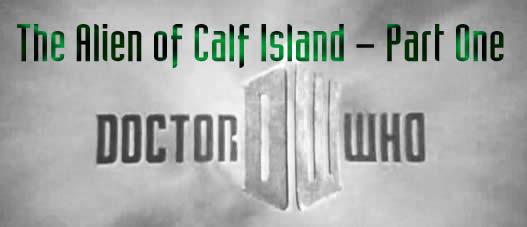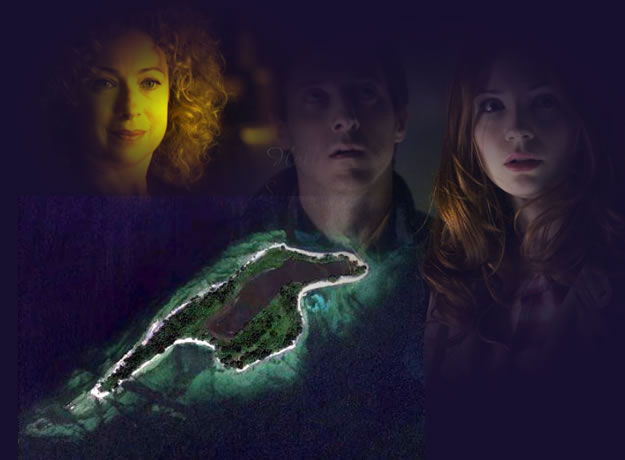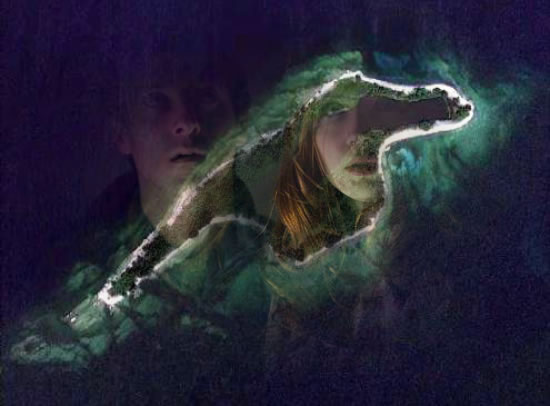

Mrs Amelia Williams, sometimes known as Amy Pond, opened the door of her comfortable New York apartment expecting a grocery delivery or the postman. She was surprised and a little disturbed to see her daughter, Melody, sometimes known as River Song.
Professor River Song, fifty-first century archaeologist, sometimes criminal, sometimes wife of The Doctor.
Thoughts of The Doctor wrenched at Amy’s heart. She had managed not to think of him for so long – over ten years, now.
With a lot of emotional effort she had managed not to think about River, either, in all of that time.
It seemed like another lifetime altogether.
“You can’t be here. The Doctor said nobody can travel in time back to New York. It would cause cataclysms in the space-time fabric or… whatever.”
“Well, that’s nice, mummy dearest,” River answered her. “’You CAN’T be here!’ Obviously I AM here, so aren’t you even going to ask me in?
“Come in,” Amy said. “Of course you can come in. I’m… thrilled to see you. But I still don’t understand how….”
“I didn’t travel in time in New York,” River answered. “I travelled in time in Liverpool and then took a ship. It was a very enjoyable trip. Lots of young officers coming home from Europe. I had a delightful time.”
“Liverpool?” Amy frowned. “But….”
“I don’t know why he never thought of it, to be honest,” River continued. “It WAS only New York that was affected by the Angels. There’s no good reason why he couldn’t park the TARDIS in Los Angeles and get a train across country to see you and dad.”
“It… probably did occur to him,” Amy admitted. “But… well… I think he probably regrets the trouble he caused us. We’re safe and well here, living one day after the other at last. We’re happy. We’re… going to adopt.”
River almost didn’t hear what her mother said. When she did, she smiled warmly.
“That’s great news. I’m glad,” she said.
“Really?” Amy asked. “It’s all right by you?”
“Well, I’m hardly going to be jealous of the new baby, am I?” she pointed out. “I’m thrilled for you. I know you’ll be amazing parents.”
“I hope we will be,” Amy admitted. “We didn’t get a lot of practice last time, of course. But we decided not to dwell on the past, or the future, or anything else we can’t change.”
“That’s the spirit,” River told her. “Anyway, tell me more about that later. I’m interested in hearing about you and dad and the Calf island Incident.”
“How can you possibly know about that?” Amy asked her daughter. “It’s classified. Those files are sealed….”
River smirked as the penny dropped.
“Oh….”
“I read the files under the thousand year rule,” she explained. “The official report is so stilted and dull, though. I thought I might get the really juicy details from the two of you.”
“Let me make coffee and sandwiches, first,” Amy suggested. “This is a story that needs refreshment stops.”
She did just that, and the two women sat down again in the drawing room overlooking Central Park. Amy drank her coffee slowly as she tried to pick a place to start her tale.
“Rory had just qualified as a doctor when America came into the war,” she said. “He obviously couldn’t be a nurse in this decade, and my career options were a bit limited, so it made sense. Besides, doctors are better paid than nurses no matter what part of the century. He was drafted, of course, like all men his age, but they didn’t send him overseas, thank goodness. He was seconded to a military base here in the USA – Pine Camp. It’s a really nice place, actually. It’s in the Northern part of New York State, not far from Lake Ontario, really nice country air. We were allocated married quarters, a lovely cottage on the base. Rory was in charge of the soldiers stationed there, and also a POW camp for German and Italian soldiers. He got that job because they thought he spoke German and Italian. He doesn’t, of course. It’s the translation thing from the TARDIS.”
It had been a time of contentment for Rory and Amy. They were both glad that Rory wasn’t sent overseas with the US army. They felt ever so slightly that it wasn’t really their war, since they were born long after it was over, but at the same time they knew they had a duty to do SOMETHING for the war effort.
The POW’s Rory was in charge of had very little reason to be content. At best they were resigned to their fate. Having been transported to another continent entirely and surrounded by people who hated them there certainly wasn’t a lot of fight left in them. It was their forward thinking camp doctor who suggested that they needed some useful work to do, and they were allowed to tend to food crops on a couple of acres of land within the boundaries of the camp. They grew potatoes and vegetables that they used to eke out their own food rations.
The Italian prisoners were repatriated after their leaders signed the armistice with the Allies in 1943. By the middle of 1944 there were only Germans left, but after D-Day when the Allies began to turn the tide there were even more of them. Batches arrived nearly every week, and Rory had to give them all medical examinations.
By the start of 1945, there were two hundred of them incarcerated in the camp. Again it was Rory who managed to persuade his superiors that it would be good for them to get out now and again on recreational trips. After all, it was certain that the War in Europe would be over soon. They could afford to treat the prisoners more kindly. He persisted and was allowed an old lorry to take them out on day trips.
This was the most ambitious project so far – a weekend camping trip on Calf island, one of the sparsely populated places on Lake Ontario itself. A motor boat brought twenty-five prisoners, three guards, the camp doctor and his wife with their equipment. They set up their camp beside the inland lake that had been one of the particular draws of the island – the other being that it was uninhabited by anything other than birds and small mammals and the POW’s could have a certain freedom of movement during this little holiday from the reality of camp life.
“It’s lovely here,” Amy said, stretching herself on a blanket beside the lake. The sun was warm, but not scorching. It was a pleasant late April day in the north-east corner of America and every trouble, whether personal or political, seemed a long way off.
“It’s fantastic,” Rory agreed. “It’s good for them.” He looked at the men under his care. They were all free to wander anywhere on the island if they chose, to swim in the inland pond or walk along the beach that surrounded it. They could walk among the trees that covered most of the dry land or whatever they chose to do. A few of them did just that, but most of them were so used to being prisoners that they hardly knew what to do with their freedom. They sat or stood looking at the expanse of water in front of them as if so much space without a fence across it was startling to them.
“That’s the trouble, of course,” Rory said. “They’re completely institutionalised. They really don’t know what to do without somebody giving them a specific order. ‘Enjoy yourself’ wasn’t specific enough.”
“The war will be over in ten days time,” Amy pointed out. “They won’t be prisoners then.”
“Yes, I’ve been wondering about that. I suppose it will take a while to organise transport back to Germany for them. What will happen? Will they be allowed to move around freely after that, or will some rules still apply?”
“People won’t just stop hating and fearing Germans on May the Eighth. They won’t just be able to go down the town and have a drink in the local pub.”
“Exactly,” Rory agreed. “And that’s the pity of it all. These aren’t Nazis or Gestapo, they’re just ordinary German men. They’re no different from the Americans on the other side of the fence in the camp.”
“People won’t ever forget, though. People in Britain don’t. Even in our time, decades after, people hated Germans.”
“I don’t think that was the war,” Rory said. “I think it was the 1970 World Cup, when Germany knocked England out at the quarter finals stage.”
“Silly,” Amy teased. Then she nodded to her husband. They stopped talking about future events as one of the prisoners came towards them holding a sack that was moving disturbingly.
“What have you got there, Klaus?” Rory asked the young man.
“Kanin,” he answered. “To make hossenfeffer. A good meal, yah?”
He put the sack down and Amy opened it. The brown face of a wild rabbit peeped out.
“Oh,” she said. “Oh, no, Klaus, you can’t kill it. It’s only a little one… a baby.”
“Fleisch ist fleisch, Frau Williams,“ Gefreiter Klaus Drechsler told her. “Meat is meat. Our rations are not big.”
“Yes, I know,” Amy insisted. “But, still….” She reached out and stroked the head of the trembling creature. “Look… I’ll do you a deal, Klaus. Let this poor little thing go free, and when we get back to camp I’ll let you have five pounds of steak that I’ve got on order from the commissary. Make sauerbraten instead.”
Klaus looked at her, then at the rabbit. He lifted it from the sack and stroked it once before letting it run free. It streaked across the beach and into the trees.
“Drechsler, never mind the wildlife,” a cheerful American voice called out. It was Sergeant Michael Turner, one of the guards. “I’m going to teach you Krauts about baseball. Come and pitch a few.”
Turner threw the baseball. Klaus caught it neatly and ran to join the impromptu game. Rory watched approvingly. That was what he called socialisation.
“Of course, you realise, those steaks were for dinner on Monday evening with Colonel Masefield and his wife,” he told Amy.
“I’ll do my lamb casserole,” she answered. “Do you realise, Drechsler is German for Turner. Those two have the same surname. If it wasn’t for the war….”
“If it wasn’t for the war, Drechsler wouldn’t be here in the USA, and Turner would be in Idaho where he comes from.” Rory said. “He wants to stay here, you know. Klaus, I mean. He told me the other day. He hopes to apply for citizenship after the war. His family were all killed in the bombing of Dresden. He has nothing to go back for.”
“It’s sad,” Amy said. “So many wasted lives. Do you think they will let him?”
“Probably not. He’s just an ordinary bloke. The US government wants the German rocket scientists and physicists – even the ones that WERE Nazis. They don’t want a nobody from Dresden.”
It wasn’t fair. Amy said so. But saying so didn’t change anything. Rory reminded her of something they had decided years ago when they were first stranded in New York in the 1930s – that there was no point in worrying about what they couldn’t change. Better to make the most of every day that they had together. They had been doing that ever since, and today was no exception.
The game of baseball kept all of the men busy for most of the afternoon except for the picnic tea itself when everyone sat down to enjoy pressed tongue sandwiches followed by tinned peaches and evaporated milk served from a huge catering tin into individual mess tins and slices of home-made seed cake washed down with bottles of coca cola. It was a simple meal, but an honest, innocent one, enjoyed by all.
Afterwards, while it was still warm, some of the men chose to swim. They undressed to their underwear. If Amy had not been present it was likely they would have stripped completely, but it was necessary to keep some decorum in her presence. Turner and one of his comrades, Sergeant Warner, joined them, but the other guard, Nolan, was a non-swimmer. He pitched ball with those of the prisoners who didn’t feel like braving the water.
Rory joined the baseball game. Amy watched them all inbetween reading one of the books she had brought along.
Then out of the blue the peace of the day was disturbed. The men in the water began shouting and swimming frantically to the edge of the lake. As they scrambled out there was a cry of distress. Sergeant Turner was in trouble.
Rory was running, pulling off his clothes, but somebody was already heading towards him. Nobody was sure who it was until the two men were at the water’s edge and hands reached to help them out.
“What happened?” Amy asked as she brought an armful of grey army blankets to wrap men who were suddenly shivering with cold. “Why did they all try to get out of the water at once?”
“Something was biting me,” Sergeant Warner reported. “Biting really hard, all over my skin.”
All of the other swimmers reported the same thing except for Sergeant Turner who was unconscious and Klaus Drechsler who hovered nearby, anxiously watching as Rory Williams performed a form of artificial respiration that was not developed for a couple of decades. He didn’t care as long as it saved the Sergeant.
“Will he live?” Klaus asked. “I… I tried to reach him. I was bitten, too, but I could not leave him….”
“He’s going to be all right,” Rory assured him as Turner coughed up water and breathed raggedly. He looked around at the other two American soldiers. “In the years to come, whatever you tell people about the war… about your fight against the Nazis, try to remember that your mate here is alive because of a German who risked his life to save him.”
Warner and Nolan nodded as if the message had hit home
“My chest,” Turner murmured as he came around. “It’s burning.”
“Mine, too,” Klaus insisted. “I was… gebissen... gestochen.”
“Stung?” Rory lifted Turner’s vest and examined the red rash that stood out from his otherwise cold, pale flesh. It certainly looked like the results of being stung by something – a jellyfish or a sea urchin….
“Can’t be,” Amy pointed out. “Jellyfish and sea urchins are both salt water creatures. The clue is in the name – SEA urchin.”
Klaus lifted his own vest and showed the same red rash. The others had similar marks on their arms and legs but not so severe. They had got out of the water faster once they became aware of the problem.
“Well… come on. Let’s get you all back to camp. I’ve got a big pot of cream for treating poison ivy and nettle stings. I’m sure that’ll do the trick. Then we’ll get a fire going and make a gallon of coffee to settle everyone’s nerves.”
Amy paused in her story and poured more coffee for herself and her daughter.
“Oh, come on, mother, dear,” River said. “There has to be more to the story than that. It obviously wasn’t anything like jellyfish or sea urchins, because you don’t get them in fresh water, and that’s a freshwater lake in the middle of an island in one of the biggest freshwater lakes in North America. Besides, it had to be something more… something alien… otherwise even the American government wouldn’t have had to classify the report.”
“I need coffee,” Amy said. “Then I’ll tell you the rest. You know what the official record says, of course.”
“The official record says everyone suffered from food poisoning,” River pointed out. “The OFFICIAL official report, the one they thought they needed to seal up for a thousand years, had a lot to say about hallucinations, but they were very vague about what sort of hallucinations and exactly what caused them.”
“Yes, I know,” Amy explained. “There were reasons for that.”
“Do tell.” River smiled invitingly.
“If I tell you, remember you mustn’t tell anyone else. It’s an absolute secret.”
“Mummy, dear, I would never tell a soul. Cross my heart!”
“Including The Doctor,” Amy warned her. “Well, no, I suppose… it really doesn’t matter if you tell him. He’s ok. Anyway…. Coffee, then the rest of the story.”
To Be Continued.

 |
 |
 |